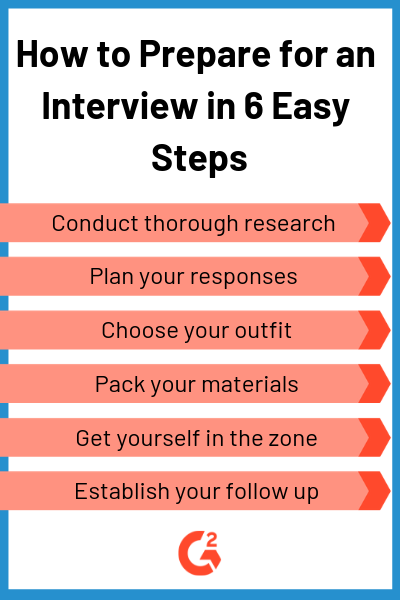It’s safe to say that many of us are familiar with the Boy Scouts' motto: Always be prepared.
When it comes to a job interview, there’s no excuse not to prepare yourself for the occasion. Failing to prepare is a waste of your own time and the time of the company interviewing you. If you want to knock it out of the park, there’s a few things you should keep in mind as you gear up for the interview process.
6 steps to prepare for an interview
- Conduct thorough research
- Plan responses and follow up questions
- Choose your outfit
- Pack your materials
- Get yourself in the proper headspace
- Establish how you plan to reach out afterwards
How to prepare for an interview
Most of the fears I have in life come from the unknown. Interviews are no exception. Spending the week leading up to an interview — or at the very least the night before — to properly prepare will help ensure that you’ve done everything you can to present yourself as the best candidate. So where should you start?
1. Do your research
By the time you’ve been contacted for an interview, you should have already done some basic research into the company or role itself. Otherwise, why did you even apply? Now, take that research a step further and really dive into the job description and the company’s mission and values, as well as its operations.
Additionally, it can be beneficial to do some digging into the person interviewing you, if that information has been provided. LinkedIn, Facebook, Instagram, YouTube - nothing public is off limits. You can use what you find to connect with them better and increase your chances.
Finally, make sure you research a little into the location of the interview. Showing up a little early requires you to know how long your travel time will be and how to access the office. Just about all of this information can be found online, so put Google to work and do your research.
2. What you say matters
Another great way to prepare for the interview is by formulating your responses to common interview questions. Your confidence will shine through with preparation, so familiarize yourself with what you can expect to be asked. You’ll shine bright in the interviewer’s eye for how easy you make it look.
| TIP: Aside from the common questions, the interviewer might throw you a curveball. Read up on how to answer behavioral interview questions so you're prepared on all fronts. |
3. Dress for the job you want
Part of answering questions is determining what your salary expectations are. This is something you should know before going into an interview, because it could easily make or break your chances at landing the job.
If you’re like me, you’re the type of person who needs plenty of time to make sure your outfit is just right. It’s hard to know exactly how to dress for an interview though, so take some time to workshop a few different looks and combinations until you come up with something that makes you feel confident and look your best.
Dressing for an interview looks different across industry and gender, so talk to some colleagues if you need to get a better picture of the clothes you should wear for your interview.

4. Don’t forget the gear
I hate showing up to anything empty handed. Typically, when going to an interview, I always bring a few extra resume copies along with a notebook and a pen. The interviewer may have already seen your resume, but a paper copy gives them something physical to remember you by and can help drive conversation. The notebook and pen are obviously for taking notes (or pretending to) which can be a good way to show your interest and enthusiasm in the job. It also provides you with something to keep your hands busy, if you’re a fidgeter like me.
| Related: Not at the in-person interview stage yet? Check out these common phone interview questions that will ensure you nail it and score an in-person meeting. |
5. Get yourself in the zone
Watch any professional sport and you might notice the athletes on the sideline listening to music to hype themselves up. In my opinion, the same theory applies to an interview. Do whatever you can do immediately before the interview to hype yourself up or calm yourself down, depending on what you need to feel confident and comfortable.
Some things that may help are going for a short walk, meditating, listening to your favorite songs, or envisioning yourself working for the company.
6. Follow up
Something that’s been greatly lost in the modern age is the interview follow-up. Thank you cards used to be the standard for this, but nowadays an email or phone call should suffice. Reaching out to the interviewer soon after the interview to thank them for their time and consideration demonstrates just how much you care about the opportunity. Very few candidates will make the effort to do this, so it’s sure to set you apart from the crowd.
Always be prepared
Use these six steps to prepare for your interview and you’re sure to walk in feeling confident and on your way to success at a new job.
Realize that maybe you’re not ready for a new job? Check out this article on how to decline an interview without looking like a jerk.
 by Izabelle Hundrev
by Izabelle Hundrev
 by Derek Doeing
by Derek Doeing
 by Derek Doeing
by Derek Doeing